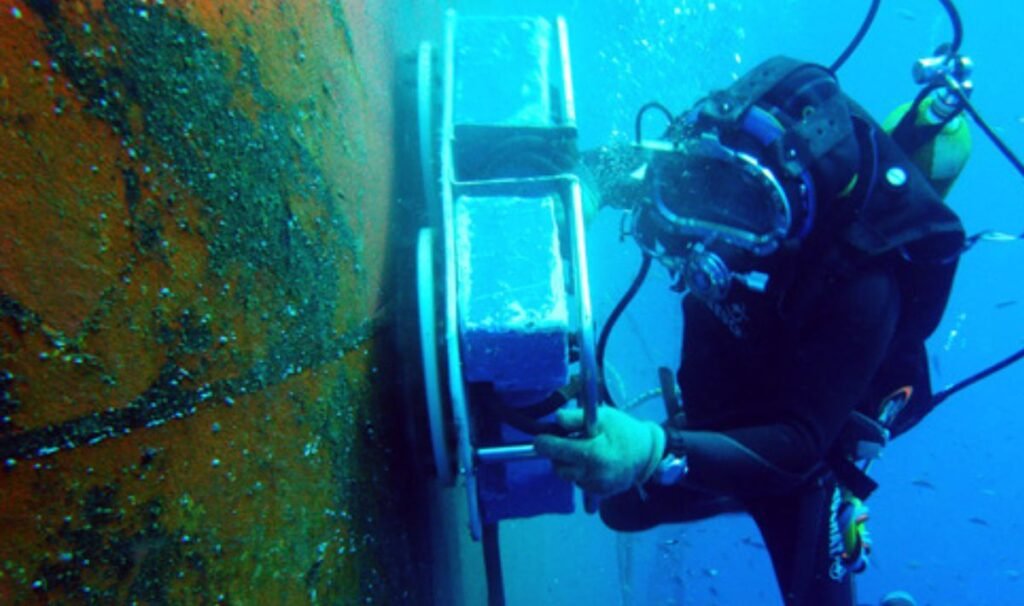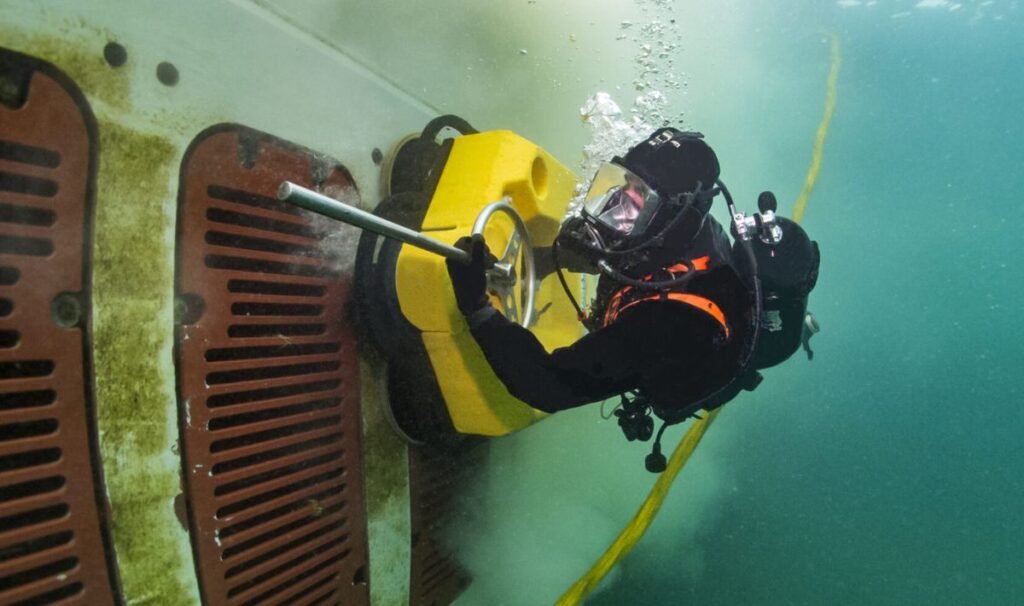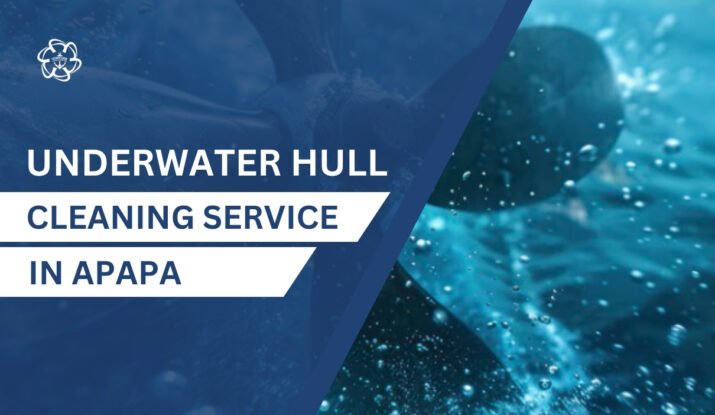What is Underwater Hull Cleaning in Apapa?
Have you noticed your ship using more fuel or losing speed at sea? These signs often go unnoticed but could be caused by something lurking below the surface—marine growth silently affecting your vessel’s performance and increasing operating costs.
Biofouling, the buildup of algae, barnacles, and slime on a ship’s hull, increases drag and forces engines to work harder. This not only leads to higher fuel consumption but also accelerates wear and tear, shortening your vessel’s operational lifespan.
Professional underwater hull cleaning safely removes biofouling while your ship remains afloat. It boosts fuel efficiency, protects the hull’s integrity, and ensures regulatory compliance, saving money, enhancing performance, and extending the life of your vessel in an eco-friendly way.
Why Apapa is Vital for Ship Maintenance
Apapa, home to Nigeria’s busiest port, is the heart of maritime trade. Its location along the Lagos coastline means ships here are exposed to nutrient-rich waters, which accelerate marine growth on hulls. For vessels operating in and out of Apapa, regular underwater hull cleaning is essential for smooth, cost-effective operations.
Understanding Underwater Hull Cleaning in Apapa
The Science of Biofouling
From the moment a vessel enters the water, it attracts microscopic organisms that form a slimy film. This layer invites larger creatures like barnacles and mussels. The result? Increased drag and higher fuel consumption.
Local Conditions in Apapa
Apapa’s tropical climate and heavy port traffic mean ships face rapid fouling. The combination of warm waters, high nutrients, and frequent vessel movement creates a perfect environment for marine growth. Neglecting regular underwater hull cleaning in Apapa can quickly lead to sluggish, inefficient ships.

Why Ships Need Underwater Hull Cleaning in Apapa
Fuel Efficiency and Cost Savings
A fouled hull can increase fuel consumption by up to 10%, costing shipowners thousands annually. Regular underwater hull cleaning in Apapa keeps vessels running efficiently, reducing fuel use and emissions.
Environmental and Regulatory Factors
Unchecked biofouling can introduce invasive species and increase pollution. Apapa, like other major ports, enforces environmental guidelines for hull cleaning to protect local ecosystems. Proper underwater hull cleaning in Apapa helps ships stay compliant and environmentally responsible.
Methods of Underwater Hull Cleaning in Apapa
Manual Diver Cleaning
Skilled divers use brushes, scrapers, and sometimes power tools to remove marine growth from the hull. This method is effective for targeted cleaning and hard-to-reach areas but is labor-intensive and requires strict safety protocols.
Robotic and Automated Cleaning
Modern solutions in Apapa include underwater robots that attach to the hull and use rotary brushes or jets to clean large areas quickly. Robots reduce diver risk and often collect debris to prevent pollution.
High-Pressure Water Jets
This method uses streams of water at high pressure to blast away marine growth. It’s fast and effective, but must be used carefully to avoid damaging the hull’s protective coatings.
Step-by-Step Hull Cleaning Process
Inspection and Assessment
Before cleaning, divers or robotic systems inspect the hull to assess fouling. This helps determine the best cleaning method and ensures all problem areas are addressed.
Cleaning Execution
Divers or robots systematically clean the hull, focusing on propellers, rudders, and water intakes—critical for vessel performance.
Post-Cleaning Checks
After cleaning, the hull is re-inspected to ensure all growth has been removed and the protective coating remains intact. Detailed reports, often with photos or videos, are provided to shipowners for records and compliance.
Benefits of Regular Underwater Hull Cleaning in Apapa
Enhanced Performance
A clean hull glides through water with less resistance, improving speed and maneuverability. This helps ships meet schedules and avoid costly delays.
Reduced Maintenance Costs
Routine cleaning prevents heavy fouling, reducing wear on engines and propellers and minimizing the need for expensive repairs or dry-docking.
Environmental Protection
Regular underwater hull cleaning in Apapa helps prevent the spread of invasive species and reduces pollution, supporting sustainable shipping practices.
Challenges and Best Practices in Apapa
Safety for Divers and Crews
Underwater hull cleaning in Apapa requires certified professionals and robust safety measures. Risks include low visibility, strong currents, and entanglement hazards.
Minimizing Environmental Impact
Cleaning teams in Apapa use best practices: gentle cleaning methods, debris collection, and avoiding excessive abrasion of antifouling coatings to protect the port’s ecosystem.
Choosing the Right Service Provider in Apapa
What to Look For
- Certified, experienced divers or robotic operators
- Modern, well-maintained equipment
- Compliance with local and international environmental regulations
- Transparent documentation and reporting
Future Trends in Underwater Hull Cleaning in Apapa
Robotics and AI
The future of underwater hull cleaning in Apapa is high-tech. Robotics and artificial intelligence are making cleaning faster, safer, and more precise. Expect to see more autonomous hull crawlers and advanced inspection tools in the years to come.

Eco-Friendly Solutions
Innovative cleaning technologies use filtered water, biodegradable agents, and gentle brushes to protect both the hull and the environment, making underwater hull cleaning in Apapa greener than ever.
Conclusion
Underwater hull cleaning in Apapa is more than just routine maintenance—it’s a strategic investment in your vessel’s performance, efficiency, and environmental compliance. By selecting the right methods and service providers, shipowners can maintain their vessels at peak performance while preserving the unique marine environment of Apapa for future generations.


